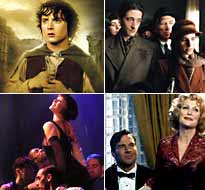
People in the industry like to complain that the Oscar race has changed, that an ambitious studio chief like Harvey Weinstein or Jeffrey Katzenberg can just buy an award with a fat wallet and a nasty whisper campaign. But the real sea change in Oscar marketing took place back in 1991, when producer-star Warren Beatty’s labor of love Bugsy went up against the big-budget Hook, both released by TriStar. Beatty needed to get his money out of the back-end grosses, so when Bugsy opened to great reviews but soft box office, he insisted that TriStar spend heavily – an unprecedented $25 million – promoting the movie for the Oscars. Lo and behold, the film grabbed ten nominations, won two, and a new era in big-spending Oscar campaigns was born.
Oscar contenders used to be grand-scale epics put out by equally grand-scale studios: Gandhi (Columbia), Reds (Paramount), The Last Emperor (Columbia), Lawrence of Arabia (Columbia), Braveheart (Paramount). And with the exception of a few Zeitgeist-nailers like Annie Hall and American Beauty, most Oscar movies are full of eye-zapping visuals, exotic locations, lavish sets, costumed extras, and heart-stopping action.
What has really changed is that although the studio chiefs used to take pride in winning statuettes for their most lavish productions, no big company will make a period extravaganza like Bugsy anymore. Today, the only ones with the chops and the cash to produce multiple Oscar winners are DreamWorks, New Line, and Miramax. The other studios usually manage to come up with a fluke contender or two – mainly because powerful players push forward risky projects like Paramount’s Forrest Gump, Universal/Imagine’s A Beautiful Mind, or Michael Mann’s Ali (Sony).
Though the 2003 Oscar race will continue that trend, it’s shaping up as the most competitive in years: At least a dozen movies are real contenders for the five Best Picture slots. The winners usually fit snugly into one of six beloved Academy genres.
Here’s how the race is shaking out…
The Oscar Races
Who are the early favorites in the major categories? Get our scorecard.
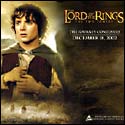
The Lord of the Rings: The Two Towers. Widely considered better than the first installment (which earned thirteen nominations and four wins), New Line’s The Two Towers has mass appeal and gorgeous grand-scale filmmaking (fantasy landscapes, heroic battles, spectacular visual effects). The performances are stronger than the original’s, especially those of Viggo Mortensen and the computer-enhanced Andy Serkis. Plus: Post-9/11, there’s a resonance to the movie’s mythic war between good and evil. Minus: Been there, done that. Gangs of New York. Martin Scorsese’s nineteenth-century epic follows the dangerous precedent of such filmmakers as Michael Cimino (Heaven’s Gate) and Francis Ford Coppola (Apocalypse Now): Brilliant filmmaker leaps into the budget abyss. Which way will it go? Plus: Academy voters will likely appreciate this $100 million–plus period gangster drama’s cinematic virtues even if mainstream moviegoers don’t, and Daniel Day-Lewis will be the man to beat for Best Actor. Minus: Oscar magician Harvey Weinstein’s Miramax has recently lost much of its crack marketing team.
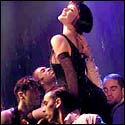
Chicago. Stage director Rob Marshall’s adaptation of the Bob Fosse musical is riding the coattails of last year’s Oscar sleeper Moulin Rouge! A flash-’n’-trash feel-good romp, Miramax’s Chicago will get some mileage from the Golden Globes but may lack the class to score with Academy voters (remember Evita?). Plus: Renée Zellweger’s heartless wench, Roxie Hart, will easily nail a Best Actress spot – Zellweger is adored by her fellow actors. And ubiquitous supporting man John C. Reilly (The Good Girl, Gangs of New York) may be this year’s Jim Broadbent. Minus: Chicago could peak early and allow a later entry with momentum to forge ahead. Catch Me If You Can. Steven Spielberg’s breezy sixties caper gives moviegoers the seductive Leo they crave, while Tom Hanks chews the scenery as the dogged FBI man chasing down DiCaprio’s check-kiting rascal-on-the-lam. Plus: Oscar-savvy DreamWorks is pushing the movie, which could beat out Twentieth Century Fox’s (and Spielberg’s) visually stunning but lightweight Minority Report. Minus: Does it have enough heft to rise to an Academy level?
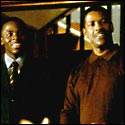
Antwone Fisher. Last year’s Best Actor, Denzel Washington, waited years to make his directorial debut with this great, real-life saga, written by Fisher. Rookie Derek Luke movingly portrays a damaged young sailor’s painful journey to growth and reconciliation in this Fox Searchlight release. Plus: The Academy’s 1,300 actors love actor-directors like Robert Redford (Ordinary People). Minus: Not a feast for the eyes. Far From Heaven. Todd Haynes’s critically hailed Douglas Sirk homage needs to thrive outside of limited release in major cities (Paul Thomas Anderson’s Punch-Drunk Love collapsed in suburbia). Plus: Julianne Moore will certainly win a Best Actress nomination for her performance as a fifties housewife who seeks comfort from her black gardener (Dennis Haysbert) after seeing her husband (Dennis Quaid) kissing another man. Minus: The Focus Features flick may be too academic for the average Academy voter.

The Hours. Writer David Hare (adapting Michael Cunningham’s Pulitzer Prize– winning novel) and director Stephen Daldry (Billy Elliot) deliver a delicately balanced cinematic triptych in three periods (twenties, postwar, and today). Plus: stellar performances from Nicole Kidman, as the precariously depressed writer Virginia Woolf, and Julianne Moore and Meryl Streep as two spinoffs of Woolf’s fictional Mrs. Dalloway. Minus: Paramount could use Oscar-campaign advice from production partner Harvey Weinstein, whose attention may be diverted by his own Oscar-hungry children. Frida. Julie Taymor’s rowdily romantic biopic could be one of those Miramax movies that critics don’t like but Oscar voters embrace, like Chocolat or The Cider House Rules. The art-house hit might earn nominations for cinematography, art direction, score, and costume design. Plus: Frida’s charming producer-star, Salma Hayek, might be this year’s Halle Berry – a bodacious babe who finally proves her mettle as a Serious Actress. Minus: Co-star Alfred Molina may not campaign in the U.S. for the film.
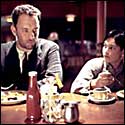
Road to Perdition. Like Gladiator or Saving Private Ryan, this could be the lauded summer movie that returns for a successful Oscar run. It has all the earmarks of a contender: literate script by David Self, elegant mise-en-scene from director Sam Mendes (American Beauty) and cinematographer Conrad Hall, and deeply felt performances by Tom Hanks and Paul Newman. Plus: DreamWorks won’t let voters forget the movie. Minus: This film is more admired than loved. 25th Hour. Spike Lee’s best movie since 1992’s Malcolm X (nominated for two Oscars) was adapted by hot-as-flapjacks young writer David Benioff from his novel. Two-time Oscar nominee Edward Norton plays a busted drug dealer with one night left before he is to begin serving a seven-year prison term; pal Barry Pepper (Saving Private Ryan) stands out in a stunning ensemble. Plus: Norton’s regret at his wasted life is echoed by the larger reality of scarred New York City post-9/11. Minus: Disney is not known for adroit Academy marketing.
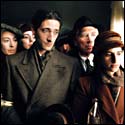
The Pianist. The winner of the Cannes Palme d’Or, it was criticized by some festival reviewers for its old-fashioned straight-on narrative. Director Roman Polanski tapped into his own Kraków ghetto childhood to enrich this harrowing, true story of a Warsaw Holocaust survivor (Adrien Brody). Plus: The Focus Features marketing team delivered multiple nominations for Traffic and Gosford Park. Minus: The Academy may shun the exile Polanski, who refuses to return to the States to face an outstanding statutory-rape charge. The Quiet American. Michael Caine has the role of a lifetime as Graham Greene’s boozily corrupt Vietnam foreign correspondent, who loses his Vietnamese girlfriend (Do Thi Hai Yen) to CIA zealot Brendan Fraser. Plus: Australian director Phillip Noyce gets extra points for ditching the Tom Clancy franchise to make back-to-back art films, The Quiet American and Rabbit-Proof Fence. Max. Writer Menno Meyjes (The Color Purple) makes his directing debut with this chilling portrait of the Führer as a young artist in the improbable but real-life story of the relationship between two German World War I vets: decadent Jewish art dealer Max Rothman (John Cusack) and impoverished Aryan artist Adolf Hitler (Noah Taylor). Plus: Lions Gate Films has done remarkably well, with eleven Oscar nominations and four wins for such films as Amores Perros and Monster’s Ball. Which of these has what it takes to win? Throughout December and January, Oscar promoters will flood the trade papers with quote ads, mail out piles of videos and DVDs, and screen their movies at holiday film series in Aspen and Maui, where some of the wealthiest players among the Academy’s 5,700 mostly middle-aged, liberal, white male voters spend the holidays. And they’ll try to nail every win from every possible critics’ group and awards ceremony on the road to the Oscar nominations February 11. But as a nervous country recovers from a shattering assault and prepares for war, one movie will conjure that elusive but powerful blend of escape and catharsis. The movie that perfectly fulfills that need will win the big prize, the Best Picture Oscar.
The Oscar Races: Ranking the Field at the First Furlong
Front-runners
• Antwone Fisher
• Chicago
• The Hours
• The Lord of the Rings: The Two Towers
• Road to PerditionChallengers
• About Schmidt
• Catch Me If You Can
• Far From Heaven
• Frida
• Gangs of New York
• The Pianist
• The Quiet American
• 25th Hour
Front-runners
Stephen Daldry
(The Hours)
Peter Jackson
(Lord of the Rings)
Sam Mendes
(Road to Perdition)
Martin Scorsese
(Gangs of New York)
Denzel Washington
(Antwone Fisher)Challengers
Paul Thomas Anderson
(Punch-Drunk Love)
Paul Thomas Anderson
(Punch-Drunk Love)
Alfonso Cuarón
(Y Tu Mamá También)
Todd Haynes
(Far From Heaven)
Spike Lee
(25th Hour)
Phillip Noyce
(The Quiet American)
Alexander Payne
(About Schmidt)
Roman Polanski
(The Pianist)
Steven Spielberg
(Catch Me If You Can)
Front-runners
Michael Caine
(The Quiet American)
Daniel Day-Lewis
(Gangs of New York)
Tom Hanks
(Road to Perdition)
Derek Luke
(Antwone Fisher)
Jack Nicholson
(About Schmidt)Challengers
Adrien Brody
(The Pianist)
Nicolas Cage
(Adaptation)
John Cusack
(Max)
Leonardo DiCaprio
(Catch Me If You Can)
Edward Norton
(25th Hour)
Dennis Quaid
(The Rookie)
Sam Rockwell
(Confessions of a Dangerous Mind)
Front-runners
Nicole Kidman
(The Hours)
Diane Lane
(Unfaithful)
Julianne Moore
(Far From Heaven)
Meryl Streep
(The Hours)
Renée Zellweger
(Chicago)Challengers
Salma Hayek
(Frida)
Samantha Morton
(Morvern Callar)
Front-runners
Chris Cooper
(Adaptation)
Ed Harris
(The Hours)
Alfred Molina
(Frida)
Paul Newman
(Road to Perdition)
Tom Hanks
(Catch Me If You Can)Challengers
Richard Gere
(Chicago)
Viggo Mortensen
(Lord of the Rings)
Barry Pepper
(25th Hour)
Dennis Quaid
(Far From Heaven)
John C. Reilly
(Catch Me If You Can)
Denzel Washington
(Antwone Fisher)
Front-runners
Kathy Bates
(About Schmidt)
Patricia Clarkson
(Far From Heaven)
Julianne Moore
(The Hours)
Samantha Morton
(Minority Report)